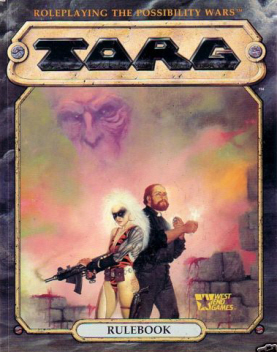Back in the late 90’s, I regularly met with a gaming group and played Torg.
Torg was a RPG from West End Games. (Which sadly is no longer in business.)
Now, I fondly remember the campaign we were on went on for about a year, and we shared many laughs and had a lot of fun. It was my first introduction to the RPG. Perhaps that is why I have a special place in my heart for it.
I will explain the setting as it was explained to me, and got me hooked. Imagine our earth, divided into different “realities”. For example, the UK is a fantasy setting, The middle east is like a pulp era Indiana Jones setting, Japan is a modern/near future setting. India is like a Victorian Horror setting. France is a cyberpunk setting, and North America is a mad max/prehistoric setting. Each setting is “ruled over” by a “High Lord” and each of the High Lords have their own schemes, and are vying to expand their realms to take over all of earth with their own reality. Sometimes they ally, most of the time, they are pit against each other. Sound like fun? Well, it gets better; you can have a character from any setting! So in your group of heroes you can have a wizard, a dashing “Shadow” type character, a cyborg, a ninja, and a half dinosaur- half man character. The possibilities are endless!
And speaking of possibilities, they are actually a game mechanic. Characters can manipulate reality. (The bad guys can do this too if they are powerful) Think of possibilities like money, you have 3 you can “spend” per chapter, they can be spent to re-roll a dice roll, improve stats, or to reduce damage. After every chapter, the GM can decide to give one or more possibilities based on performance. (Particularly good moves, or character actions, or roleplaying.)
Not only did the system utilize “Possiblities”, it had a unique card based system as well.
(From the Wikipedia entry on Torg)
In addition, Torg used an unusual card based system to augment gameplay. A hand of cards were dealt to each player at the beginning of the game. The rest were stacked in front of the game master. Cards could be used by both players and game masters to influence play. Whenever a combat encounter began the game master would flip over a card which would dictate certain advantages and disadvantages for the players and the NPCs. Players could also use cards to give themselves advantages or even plotlines which could result in extra points.But wait there’s more…
The system used a d20 system
A player rolls a d20 and consults a small table (printed on the character sheet) to determine the bonus number. The bonus number (which can be negative) is then added to the appropriate skill or attribute. This value is then compared to a difficulty number to determine success. Some skills or actions need a level of success to be determined, in which case the amount the value exceeds the difficulty number by is used to determine the level of success (the GM has a table he consults). Characters can use skills that they don't actually have (you can shoot a gun even if you've never done it before) but their chances of success are lower. Some or the more difficult skills (like Air Vehicles) can only be used by characters with adds in the skill.
A nice feature of the system is that characters can reroll the die and add to their previous roll in certain situations. Characters using a skill that they have can reroll and add if they roll a 10, a 20, or spend a "Possibility" on the die roll.
Here is a good website dedicated to Torg.
I wish I could get a group together and play…



Sounds like the bastard offspring of Ravenloft and Savage Worlds.
ReplyDeleteThat's kinda cool.
Also, RIP West End Games indeed; Paranoia was excellent before they started their death spiral and I have fond memories of the second edition in particular.
This game actually sounds really cool.
ReplyDelete